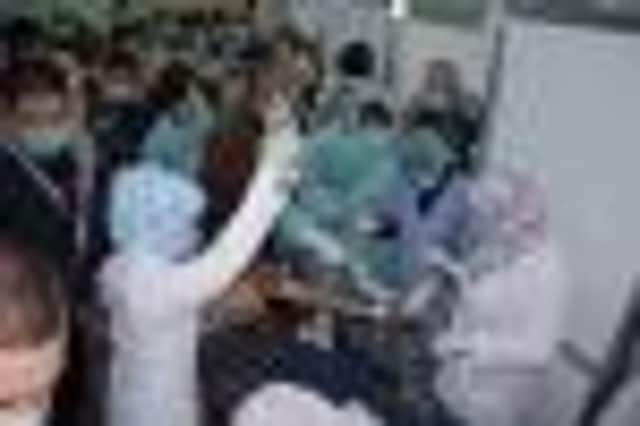Syria and rebels blame each other for attack


If confirmed, it would be the first use of such weapons in the two-year civil war which has claimed more than 70,000 lives.
American pesident Barack Obama, who has resisted overt military intervention in Syria, has warned president Bashar al-Assad that any use of chemical weapons would be a “red line”. There has, however, been no suggestion so far of rebels possessing such arms.
Advertisement
Hide AdAdvertisement
Hide AdSyria’s state TV said rebels fired a rocket carrying chemicals that killed 25 people and wounded dozens more. The pro-opposition Syrian Observatory for Human Rights, said 16 soldiers were among the dead.
The most notorious use of chemical weapons in the Middle East was in the Iraqi Kurdish city of Halabja where an estimated 5,000 people died in a poison gas attack ordered by former Iraqi dictator Saddam Hussein 25 years ago.
Last night, the US administration flatly rejected the claim rebels had used chemical weapons, calling it a desperate attempt by a beleaguered regime to distract attention from its own atrocities.
One US official said there was no evidence either side had used such weapons.
No western governments or international organisations confirmed a chemical attack in Syria, but Russia, an ally of Damascus, accused rebels of carrying out such a strike.
Syria’s deputy foreign minister, Faisal Meqdad, said his government would send a letter to the United Nations’ Security Council “calling on it to handle its responsibilities and clarify a limit to these crimes of terrorism and those that support it inside Syrian Arab Republic”.
He warned the violence that had engulfed Syria was a regional threat. “This is rather a starting point from which [the danger]will spread to the entire region, if not the entire world,” he said.
The US said it had no evidence to show the rebels had used chemical weapons.
Advertisement
Hide AdAdvertisement
Hide AdThe UK said its calculations would change if a chemical attack had taken place. A Foreign Office spokeswoman said it would “demand a serious response from the international community and force us to revisit our approach so far”.
A photographer said he had visited victims in Aleppo hospitals suffering breathing problems and that people had said they smelled chlorine after the attack.
“I saw mostly women and children,” said the photographer. He quoted victims at the University of Aleppo hospital and the al-Rajaa hospital as saying people were dying in the streets and in their houses.
Mr Assad is widely believed to have chemical weapons.
Syrian officials have said that if such an arsenal existed it would be used to defend against foreign aggression, not Syrians. There have been no previous reports of chemical weapons in the hands of insurgents.
Information minister Omran al-Zoabi said rebels fired “a rocket containing poison gases” at the town of Khan al-Assal, south-west of Aleppo, from the city’s south-east district of Nairab, part of which is rebel-held.
“The substance in the rocket causes unconsciousness, then convulsions, then death,” Mr al-Zoabi said.
But a senior rebel commander, Qassim Saadeddine, a spokesman for the Higher Military Council in Aleppo, blamed Assad’s forces. “We believe they fired a Scud with chemical agents,” he said by telephone from Aleppo.